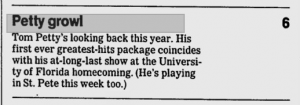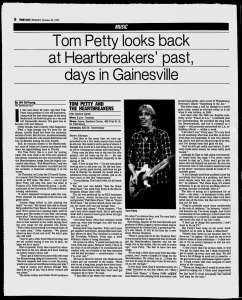Music: Tom Petty looks back at Heartbreakers' past, days in Gainesville
By Bill DeYoung
Lakeland Ledger - Friday, October 29, 1993
It was just about 20 years ago that Tom Petty said goodbye to the old hometown. Along with the four other guys in the band Mudcrutch, he threw his hear in a van and left Gainesville forever. His goal was to become rich and famous.
Oddly enough, that's exactly what happened.
What a long strange trip it's been for the skinny, scruffy blond kid from the northeast section of town. He's 43 now, an internationally recognized rock star who counts Bob Dylan and two ex-Beatles among his best friends.
Still, he remains closest to the Heartbreakers, most of whom he's known and played with since his nightclubbing days in Florida.
For Tom Petty, this is a year for looking back. Out next week is his first-ever greatest hits album, including his best-loved tracks with the Heartbreakers, songs from his hugely successful solo album, "Full Moon Fever," and two new Heartbreakers numbers recorded just for the occasion. A boxed-set anthology is in the works.
On Thursday, he'll play the O'Connell Center, in a concert that'll be broadcast live around the world on FM radio. The snow -- one of just three Petty will play this year; the other is Tuesday at St. Pete's Bayfront Arena -- is officially part of the University of Florida's Homecoming celebration.
It wasn't supposed to happen quite this way, Petty explains via telephone from his Los Angeles home.
"Johnny Depp talked us into playing one night," he says. "He opened this club on Sunset Strip called the Viper Room. He came to us and said, 'We're gonna have opening night, and I'm gonna give the money to sick kids, and please come play. You can play whatever you want.'"
The band, which hadn't toured for two years, was at that moment in the studio laying down the new songs for the greatest hits album. "With a little arm-twisting I convinced them all to come play," Petty explains. "We played about an hour of just new stuff. We didn't play any old stuff.
"And we got a little buzz behind playing, and we sat around saying it was fun to play, we hope we do it again."
End of episode. Petty then turned his attention back to the solo album he'd been working on before Depp's phone call.
"Then I got a letter from some fella who runs the Homecoming thing in Gainesville," he says. "Several requests had come in over the years, would be come around Homecoming and play?
"And of course we'd always thought, 'Boy, that'd be a lot of fun,' but it never worked into our plans."
The letter-writer was Gator Growl producer Shawn Schrager.
"And then at the same time we were approached to do a live radio concert that would go all over this country and to parts of others. I thought that would be a cool thing to do, as long as we're releasing this album and everything."
Petty says his plan was to dig into the solo project, and not come up for air -- for any reason -- until it was finished, hopefully in the spring of '94.
Still, "I love to play live -- I'm not nuts about touring year in and year out. On the last tour, we did a pretty good stretch, and when we got done in Europe we decided we would take a sabbatical from touring for awhile, just so we don't start to feel like 'entertainers.'
"I love playing. That's still what it's all about to me."
The last tour was behind "Into the Great Wide Open," the ninth Tom Petty & the Heartbreakers album since 1976.
The set was produced by ex-ELO frontman Jeff Lynne, whose distinctive style had invigorated "Full Moon Fever." But on "Great Wide Open," the critics carped, there was simply too much Jeff and not enough Tom.
"I loved that album," Petty counters. "You can't help what people think. But it sold quite well! And it seems to have gone down all right with a lot of people.
"And often times, when that criticism would come up, what they thought was Jeff was me, and vice versa."
During their time together, Petty and Lynne got together with Dylan, George Harrison (and, just before he died, Roy Orbison) to record as the Traveling Wilburys. Petty says a third Wilburys album is being discussed.
Of Lynne, he offers, "I would certainly like to work with him again. Because, really, I have to say that of all the people I've encountered and worked with, he certainly is the best musician and the best arranger -- record-maker -- that I've ever met."
He has no time for anyone who thinks he and Lynne got too chummy in the studio. "When you're out a long time, people have their favorite sort of periods of what you do, they say 'He should be more like he was then,' but I can't get wrapped up in that," he says.
"I just kind of go where the wind takes me. It's what I've always done, and I'm sure that's what I'll continue to do."
Rick Rubin, founder of Def Jam Records and producer of Mick Jagger's recent album and an upcoming set by Johnny Cash, is producing Petty's solo album. It will be his first for a new label, Warner Brothers.
"When it came time to do the 'Greatest Hits' it was actually Rick's suggestion that we should get the Heartbreakers together and cut the songs live in the studio, like we used to years ago," says Petty. "We had to have two new songs.
"So we took a little time away from the other project, and I wrote a handful of songs for the Heartbreakers. We called 'em in ...I think the list was 30 songs in two days' time. So we had a lot to sift through."
In two days' time, they'd recorded nearly 15 songs. Included on the hits album are "Mary Jane's Last Dance," a bluesy Petty original that features him playing both harmonica and second lead guitar, and a cover of Thunderclap Newman's classic "Something in the Air."
The latter song, a call for change in a world gone crazy, seems as relevant today as it did when it was written, in 1969.
Just days after the 1992 Los Angeles riots, Petty wrote "Peace in L.A.," a heartfelt plea for understanding. He recorded the song with the Heartbreakers, and had it released as a single -- with proceeds earmarked for L.A. rebuilding efforts -- within a week.
"I do what I can," Petty says. "It's very hard to tell somebody what that was like, to be here when that was happening. It was very disturbing. And it was just my natural urge to do that, and I've always been real glad we did.
"And we still get really nice letters. It obviously made some money for some really good causes."
Although he likes to talk about environmental issues from the stage ("I've never really learned to shut up"), Petty won't go the distance and call himself an activist. He was one of the first rock 'n' roll artists to insist that cups at his shows' concession stands be made of recyclable paper.
"A lot of people used their position to just hip everybody that there is a problem, and here's some simple ways that you can help a little bit," he explains. "But these days, it's almost redundant to go up and say anything about recycling, because everybody does it."
The idea of acting as a spokesman for an issue -- any issue -- is anathema to him, quite frankly. He's well aware that other rock stars speak out all the time, but that sort of thing is just not for him.
"They're probably much more comfortable in the role of celebrity," he believes, "which I can honestly say I've never sought. And I have no intention of ever seeking it. I don't want to be a personality or a celebrity. I just make music, and that's the end of my job, really.
"I don't go to things like premieres. I don't want to be on TV."
But Petty's fan hang on his every word. Wouldn't he be able to make a difference?
"Maybe they listen to me because they believe me," he replies. "It's hard for me to ever believe some of these celebrities -- I often wonder if it's an actor's business to tell me anything, or a musician.
"I don't know that I'm always right, or that I've got the right idea, but I think somebody's got to speak up every now and then. We still have a lot of things to work out in America -- the gay issue is one, and human rights in general. I think racism still runs rampant in some areas of the country.
"These are things that I would be most interested in helping out. I think most importantly we just have to treat everybody like humans and hope for the best."


